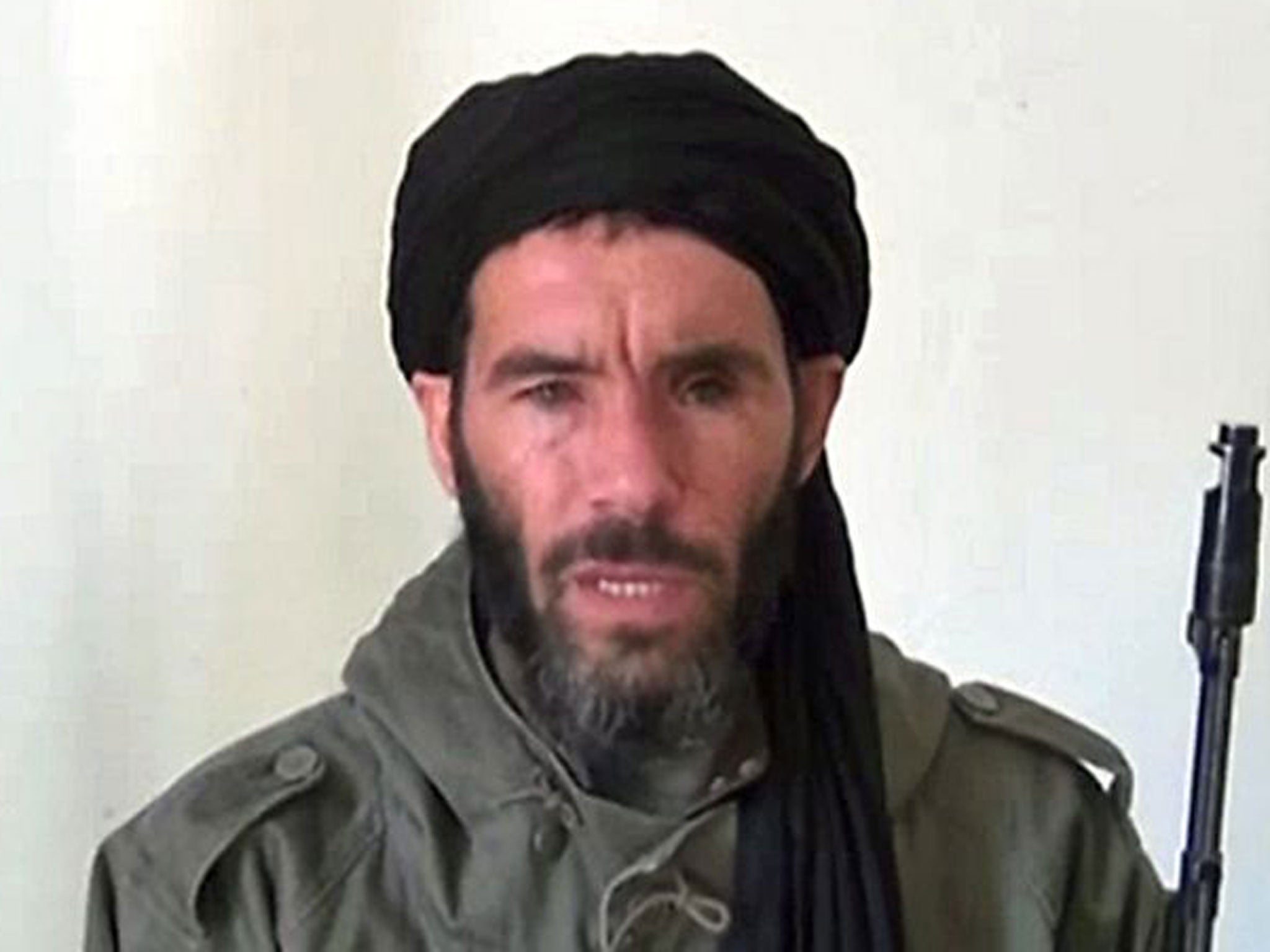'This is the eighth time' – caution greets reports of Mokhtar Belmokhtar's death
DNA samples taken but Western experts say it is unlikely sworn enemies would be killed together

Western governments were treating with extreme caution tonight claims that Chadian forces had killed Mokhtar Belmokhtar, the elusive Islamist chieftain responsible for the attack on the Algerian BP gas field in January.
Defence officials in France said they had no confirmation of Chad’s claims that its forces had killed both Belmokhtar and Abu Zeid, the principle Al-Qa’ida leader in the Sahel, during intense battles in the mountains of northern Mali in recent days.
Paris did announce, however, that the fighting – among the most violent since France intervened in Mali two months ago – had claimed the life of a French paratrooper.
DNA samples taken from the bodies that Chad claims are those of Belmokhtar and Abu Zaid are being sent to the authorities in Algiers, according to Western diplomatic sources. Both men are Algerian nationals. The Western officials stressed that they had no independent verification that the two men had been killed.
French experts on Islamist radical movements expressed some doubt about the claims. They pointed out that Islamists were usually quick to acknowledge the deaths of their own leaders and to claim them as “martyrs”. They also stressed that the two men, although once allies, were now sworn enemies and that it was unlikely that both had taken refuge in the Adrar des Ifoghas mountains close to the Mali-Algeria frontier.
Professor Jeremy Keenan, a British social anthropologist and an expert on the Sahel region, said it was possible but “on the whole unlikely” that the two leaders had been killed.
“We know [Belmokhtar] has not been in the area for months. How did he get through the French and Chadian forces which have been surrounding the mountains? This is the eighth time he has been reported killed. I would be very surpised if it is true.”
Henry Enscher, the American envoy in Algeria, is reported to have told Washington last month that the French hunt for Islamist leaders in Mali was progressing better than expected. He said “developments” could be expected in the near future. Much of the intelligence used by the French is said to have come from US drones and satellites, and electronic intercepts.
Belmokhtar, 40, known as “the one-eyed” or “Marlboro Man”, is an independent Islamist fighter and a trafficker in cigarettes and gold who was once allied to al-Qa’ida. His breakaway group, “Those who sign in blood”, claimed responsibility for the attack on the In Amenas gas field in eastern Algeria in January in which 39 Western hostages and 29 Islamists were killed.
Abu Zeid, 48, is the principle leader of al-Qa’ida in the Islamic Maghreb (AQIM). He was responsible for the enforcement of a harsh interpretation of sharia law – under which many transgressors lost limbs – after a loose coalition of islamist groups overran northern Mali last year. He is also believed to have been behind the kidnapping and execution of Westerners, including a British hostage, Edwin Dyer, in 2009.
The death of either man would be a considerable coup for the French forces and their Chadian allies who launched an attack on the rugged Ifoghas mountains, the last Islamist bastion in Mali, two weeks ago. The offensive has been led by Chadian troops and French special forces, backed by French aircraft and helicopters.
A French paratroop corporal, Cédric Charenton, 26, was killed in running battles with islamist rebels in the mountains on Saturday. He was the third French soldier to die since France intervened to halt a rebel advance on southern Mali in January.
Defence officials in Paris said today that they had no independent evidence that either of the islamists leaders had been killed.“It is not that we doubt the good faith of the Chadian government. It is just that you have to be very careful about checking such claims, made in the heat of a battle which is still going on,” one official said.
Islamist experts in France pointed out that the government in Chad was anxious to claim significant victories in Mali after at least 20 Chadian soldiers died in battles in the Ifoghas massif last weekend. On Friday, the Chadian president, Idriss Deby, said that Abu Zeid was one of 40 Islamist fighers killed by Chadian troops a week ago. On Saturday, a Chadian military communiqué said that Belmokhtar had been killed when “the principle jihadist” base in the Ametetai valley had been destroyed earlier that day.
Neither of these claims has been confirmed by the Algeran or Malian governments. Algerian press reports said that a gun known to belong to Abu Zeid had been found on one of the islamist bodies. Photographs had been taken of all the dead fighters but none had been identified so far as Zaid.
Matthieu Guidère, professor of islamology at the University of Toulouse, said: “These reports have not been confirmed by AQIM, nor by a rival group, nor by the global leadership of al-Qa’ida. Experience tells us that jihadists do not conceal their dead but immediately proclaim them to be martyrs.”
Join our commenting forum
Join thought-provoking conversations, follow other Independent readers and see their replies
Comments
Bookmark popover
Removed from bookmarks